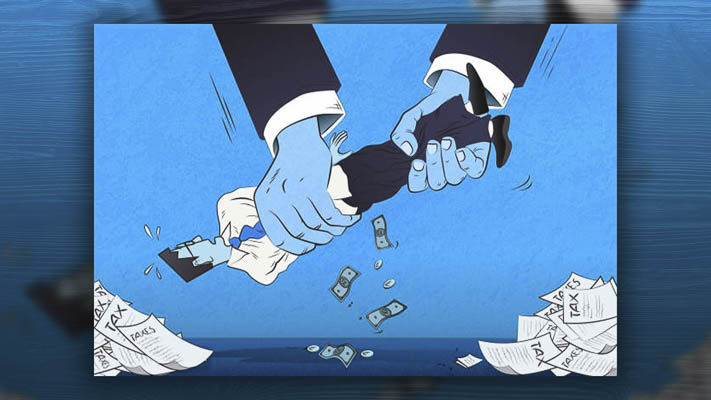
Elizabeth New (Hovde) states that when you can’t pass broad-based tax relief, even in times of surplus and crippling inflation, you clearly have no desire to
Elizabeth New (Hovde)
Washington Policy Center
There’s been debatable talk this month from lawmakers about how often bipartisan legislation successfully winds its way through Olympia. Next session, legislation that should succeed bipartisanly is broad-based tax relief.

While the state has a surplus of money it isn’t sharing with the taxpayers who provided it, increasing inflation is harming workers and their real average hourly earnings. In addition to increased prices for goods and services, Washingtonians are experiencing government inflation via new payroll taxes for workers that began in 2019 and 2023. With taxes heavy on workers’ minds in April, this month would be a perfect time for state lawmakers to vow to decrease the tax burden in Washington state when they gather next.
There have been other perfect times not taken, of course. As the editorial board of The Seattle Times wrote in 2022, “The absence of taxpayer relief in a year of a $15 billion budget surplus — and inflation at 40-year highs — strongly indicates that the current power players simply don’t care to cut. Ever.”
That year, Senate Democratic Majority Caucus Vice Chair Mona Das proposed a bill to provide a sales tax reduction of 1 percent. The bill, Senate Bill 5932, didn’t even receive a hearing, despite inflationary times, despite Washingtonians having one of the highest sales taxes in the nation and despite the bill being proposed by someone in the Legislature’s majority party.
Washington Policy Center agrees with the sound policy of sales tax relief and has been making the case for it for years.
Other sensible ways to lower taxes in our tax-surplus state were proposed recently by Republican Sen. Lynda Wilson. Her 2022 proposal, SB 5769, would have provided needed tax relief to workers, homeowners and businesses. It would have repealed one of the taxes that voters will consider in November via initiative (a capital gains tax), and it would have done away with WA Cares, a new state program with a payroll tax that voters will consider making optional, instead of mandatory. That bill had a committee hearing and was then dismissed.
Approving one of those bills would have allowed Washington state to join the many other states that have seen fit to offer taxpayers some broad-based tax relief in recent years. The Tax Foundation reported in March that those states also are seeing good economic results. It writes in “Can states afford their recent tax cuts?” that tax revenue has risen more in states that cut taxes than in those that didn’t.
“The 27 states that cut the rate of a major tax (individual income, corporate income, or sales tax) experienced a 9.8 percent tax revenue increase in real terms between calendar years 2019 and 2023, while states that didn’t cut any of these taxes — or, in a few cases, increased them — saw tax revenues grow by 6.2 percent,” writes the Tax Foundation. “The tax-cutting states grew revenue faster with lower rates.”
When Oregon collects more than it needs like Washington state has, the money is returned to Oregonians via a kicker tax credit. Our friends across the Columbia River are giddy about a record $5.61 billion surplus being returned to them this year. Those of us in Southwest Washington hearing news of the kicker regularly know how different our state’s approach to a surplus is.
All talk, no action
Legislators talk a lot about Washington state being regressive in its tax structure, while at the same time adding more regressive taxes along with “taxes on the wealthy.” The reality is that in our Democrat-trifecta state, lawmakers like tax revenue no matter who it impacts to feed a state spending problem.
The state’s operating budget has more than doubled in the past 10 years, while the population grew only 14 percent. Priorities are not being made, new programs are. And spending other people’s money is easy.
Last spring, lawmakers passed a $69.8 billion budget. The Seattle Times said of the amount, “With that kind of money, you could make the movie ‘Oppenheimer’ nearly 700 times. (Or, 481 ‘Barbies.’) And that doesn’t even include what the state spends on transportation or construction projects.”
This spring, lawmakers supplemented that budget with another $2 billion, half of which was reportedly for new policies.
When you can’t pass broad-based tax relief, even in times of surplus and crippling inflation, you clearly have no desire to. Washingtonians need that to change. Many workers in Washington state have trouble making ends meet and are watching raises their employers provide them, or that the state dictates, disappear. Lawmakers can help and should.
Elizabeth New (Hovde) is a policy analyst and the director of the Centers for Health Care and Worker Rights at the Washington Policy Center. She is a Clark County resident.
Also read:
- Opinion: An unacceptable tax burdenNancy Churchill outlines new tax proposals in Washington state, warning of growing burdens on working families amid budget shortfalls and government overspending.
- POLL: Is it time for new leadership at Vancouver City Hall?A new weekly poll asks whether Vancouver voters should prioritize replacing the mayor and city council in the 2025 election.
- Opinion: How will the majority party’s new budget and tax proposals affect you?Rep. John Ley critiques the state’s proposed 2025-27 budgets, warning of record-breaking tax hikes and economic impacts.
- Opinion: Washington’s EV sales far short of next year’s state mandateTodd Myers highlights how Washington’s EV sales fall short of next year’s mandate, raising concerns over rising car prices and limited options.
- Letter: ‘Our state and local governments need to learn to live within their means’Camas resident Lauren Colas voices strong opposition to Proposition 1 and other tax proposals, calling for state and local governments to rein in spending.










